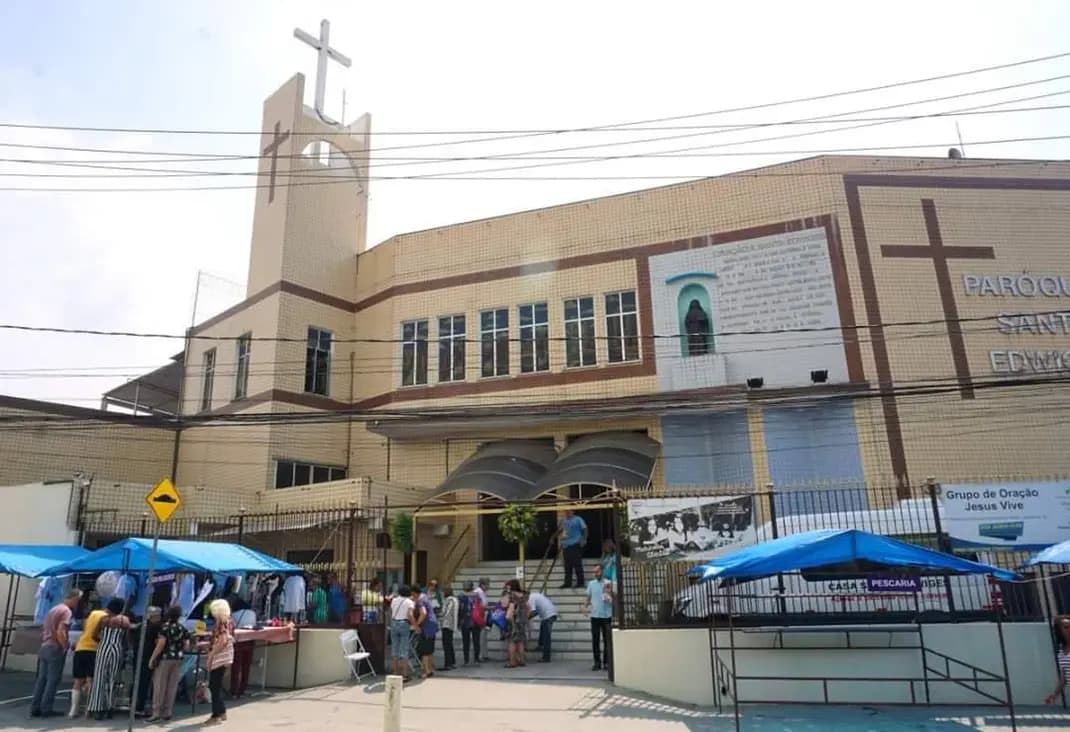SÃO PAULO – After a series of rumors about an alleged order from a powerful drug lord to shut down Catholic churches in the northern part of Rio de Janeiro, at least four parishes announced the suspension of all their activities between July 5-7.
According to the news website G1, local residents said armed men on motorcycles passed by St. Hedwig and St. Cecilia parishes in Brás de Pina, and Our Lady of the Immaculate Conception and St. Justin in Parada de Lucas and ordered the immediate suspension of all celebrations.
The churches alerted on their social media accounts that all weekend activities would be canceled, without explaination. St. Hedwig parish also announced the suspension of its traditional festivity in honor of St. John the Baptist and other saints whose celebrations are in June.
Drug trafficker Álvaro Santa Rosa, known as Peixão (“Big Fish”), a major gang commander who controls a set of favelas in the northern part of the city, is notorious in Brazil for his fervor as an Evangelical Christian. He was named as the man behind the churches’ temporary closing.
Peixão was raised in a family of adherents of Umbanda, a religion of African origin, but at a certain point he converted to Neo-Pentecostalism. After taking control over drug trafficking and other criminal actions in several favelas, he named the area under his dominance as the Israel Complex, stressing his connection with Christian Zionism. He painted the Star of David all over the region and named his gang as the Aaron’s Band.
Over the past years, Peixão was denounced several times for acts of religious intolerance. In slums under his command, Umbanda and Candomblé centers had to be closed and moved elsewhere. A number of them were attacked and vandalized by armed men under Peixão’s orders. Holy sculptures were broken or had to be permanently removed.
The reaction of the media to the closing of Catholic churches led the state government of Rio de Janeiro to declare that police forces were deployed to the northern part of the city and that all parishes were able to resume their works.
The authorities emphasized that no order had been given by any drug lord concerning the churches and that it was only a rumor. On July 7, all parishes had a regular service. St. Hedwig even resumed the June festivity.
Governor Claudio Castro, a member of former President Jair Bolsonaro’s Liberal Party, is Catholic and used to be part of a musical group connected to the Charismatic Catholic Renewal.
According to Ivanir dos Santos, a scholar and Candomblé leader who has been monitoring religious intolerance in Rio de Janeiro over the past decades, “there has been a growing violence against other creeds lately and the State failed to take action in order to combat it.”
“Attacks on Umbanda and Candomblé centers have been happening for years and nothing has been done. Hostilities to the Catholic Church have already happened in the past as well, but nothing like what occurred now,” he told Crux.
Dos Santos said serious inquiries must be carried out by the police and the judiciary when orchestrated acts of intolerance are promoted.
“It’s not relevant if it was only a rumor or if it wasn’t. We know that violence like that is common when it comes to Umbanda and Candomblé centers. Of course, such violence can be expanded to other religions too,” he said.
In dos Santos’s opinion, “Brazil needs to establish a serious plan against religious intolerance” in order to avoid the escalation of such events.
Father Luiz Antônio Pereira Lopes, who heads Rio de Janeiro’s Favelas Pastoral Ministry, said the so-called dominion theology is the ideology behind the hostilities perpetrated by such armed groups against other creeds.
Dominionism, initially a term applied to Christian groups in the United States, has been more and more debated by analysts in Brazil over the past few years due to the increasing force of Evangelicals in Brazilian politics, media, and society.
“Faith apparently became a reason to conquer territories and even to silence other religious groups. It looks like the Old Testament, when violence was employed to conquer people to one’s faith,” Pereira Lopes told Crux.
After decades working in slums, at times during violent times, Pereira Lopes said that priests confronted with such a scenario usually prefer to “dribble” the drug lords instead of directly confronting them.
“Gang leaders usually have at least one relative that frequents the church. At times, the mother of a drug lord is a member of the parish. We try to talk to that person in order to de-escalate the situation. It’s an effort that we have to do to avoid losing our space in a community,” he said.
“We can’t question them face to face. It’s like opening a hornets’ nest,” he explained.













